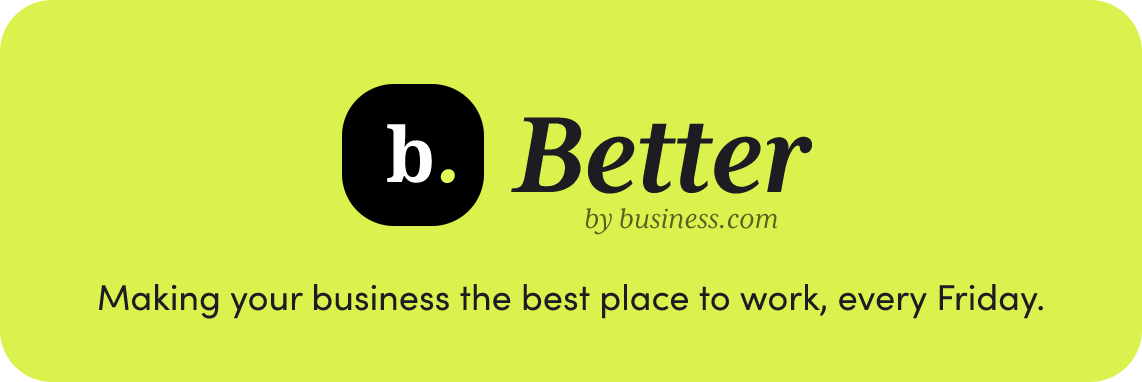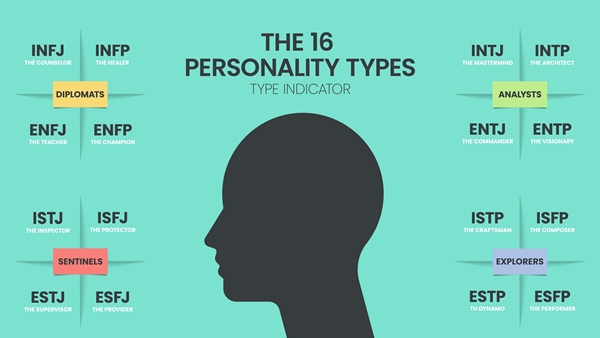Worried you’ll never be able to stop working? Here’s the good news: 25% more Americans had million-dollar retirement accounts in 2023, according to Fidelity. That includes 401(k) and IRA account holders with an average age of 59.
Although other benefits might have more razzle-dazzle, new research shows that a 401(k) match has “double the effect on a firm’s recruiting success, relative to wage dollars.” Check out our guide to what small businesses need to know about 401(k) plans.
That said, investor Michael Burry — whom Christian Bale portrayed in The Big Short — just bet $1.6 billion that Wall Street will take another nosedive. So if you’ve currently got a mil in your retirement account, maybe take a screenshot to cherish it forever just in case.
|
|
|
Employee Personality Tests: From Briggs Deal to Myers in Controversy
|
Businesses strive to develop talent, and one way to do that is by identifying (and maximizing) employees’ strengths. Approximately 80% of Fortune 500 companies use personality tests for their workforce, such as the Myers-Briggs Type Indicator and CliftonStrengths by Gallup, driving a $2 billion industry that is on track to triple by 2027.
The hope is that managers can tailor their leadership style for each direct, thus raising engagement and lowering turnover. “When you and your team use the CliftonStrengths assessment to discover what you do best, you’ll have stronger team dynamics, better conversations and increased collaboration,” Gallup explains.
But personality assessments have sometimes landed companies in hot water. In the past decade, Best Buy, Target, and CVS stopped using them for job applicants after pressure from the U.S. Equal Employment Opportunity Commission over potential race- and gender-based discrimination. (Plus, questions about confidence and cheerfulness might screen out qualified candidates with depression.)
Some experts question the basic reliability of personality tests, which are given to 80 million people worldwide each year. Psychologist Benjamin Hardy warns in his 2020 book Personality Isn’t Permanent that the assessments — which he calls an “epidemic” — aren’t based in science. In fact, they can get something crucially wrong: very few of us have fixed personalities; most individuals change over time, along with their interests and skills.
When we interpret the results of “playful” questionnaires as rock-solid gospel for understanding ourselves and our employees, Hardy writes, it’s personally and professionally limiting: “The most successful people in the world base their identity and internal narrative around the future, not their past.”
Instead of using personality tests to assess whether a candidate is a fit for the company culture, business management expert Jim Collins recommends to Leaders.com that employers ask open-ended questions allowing for self-expression. For example, “How easy do you adapt to new challenges?” and “What are you passionate about?” are more likely to elicit useful information.
And if you do use personality tests for employees, be clear it’s a lighthearted way to build team rapport and nothing more. They shouldn’t have to worry that Briggs Brother is watching them.
|
|
|
Are You Ready for Some Football? (Your Customers Are!)
|
|
|
To Improve Performance, Avoid the Feedback “Sandwich”
|
Dr. Ben Baran is an associate professor at Cleveland State University and co-founder of Elevating What Works.
If you’ve ever delivered performance feedback at work, it’s likely that you served a “compliment sandwich.” You might say, “John, you work really hard around here and I appreciate how you contributed to this project. I need you, though, to be more attentive to our deadlines. Again, I really think you’re doing a great job, so keep it up!”
At first glance, this might seem perfectly acceptable. The problem, though, is that it mixes your messages and results in a lower likelihood that the feedback recipient will make an actual behavioral change as desired.
Research suggests that providing uniformity in one’s feedback — delivering all positive or all corrective feedback — results in higher performance than mixing positive and corrective feedback in the same conversation. Using the “sandwich” (or some other combination of positive and corrective feedback) might result in less of an emotional response, but if it’s behavioral change you’re after, be consistent.
One of the better models for performance feedback is the Situation, Behavior, Impact (SBI) method. Start the conversation by describing a specific situation, followed by an observable behavior, and conclude with the impact of that behavior.
Here’s what that might look like: “John, last week we had a key deliverable due for this project. Your contribution was due on Tuesday, but you didn’t submit it until the end of the day on Wednesday. As a result, Sarah wasn’t able to start her part of the project until Thursday, and I had to notify the client about the delay.” (Of course, the SBI method is perfectly suitable for positive feedback as well.)
Using a consistent approach like SBI gives employees a clear idea of what behaviors they need to continue or change. And over time, this approach will promote an environment in which people have honest conversations about performance — a key ingredient in any winning team.
|
|
|
Building a piece of IKEA furniture can be an impressive feat … but not as impressive as building IKEA itself.
At the height of the Great Depression in Sweden, 5-year-old farmboy Ingvar Kamprad sold matches to his neighbors for pennies; everything he earned went to his struggling family. Later at boarding school, Ingvar sold watches and pens around his dorm. This gift for business impressed his father, who — as a graduation present — paid the registration fee for Ingvar to start IKEA (his initials, plus those of his farm and village), which sold knickknacks by mail order.
To stimulate demand in the post-WWII economy, the Swedish government offered loans for citizens to furnish their homes. Ingvar sensed an opportunity and debuted the IKEA furniture line: cost-effective, functional, and no-nonsense. Today, IKEA offers much of the same values to its customers all across the world, even if they need some Advil after setting it up.
Check out these inspirational quotes from Kamprad and more influential CEOs.
|
|
|
On Aug. 18 in Business History:
|
|
|
- 1872: Long before IKEA, Aaron Montgomery Ward produced the first mail-order catalog for the general public.
- 1937: The first FM radio construction permit was issued in Boston.
- 1904: Max Factor Jr., heir to (and future president of) Max Factor Cosmetics, was born.
- 1940: Chrysler Corporation founder Walter Chrysler died in New York state.
- 1998: Mrs. Field’s Original Cookies acquired the Great American Cookie Co. Twenty-three years later, FAT Brands bought the Great American Cookie Co. — along with Hot Dog on a Stick and Round Table Pizza — for nearly $450 million, a healthy profit.
|
|
|
Written by Carolyn Neuhausen and Ali Saleh. Comic by John McNamee.
|
|
|
|







.jpg)